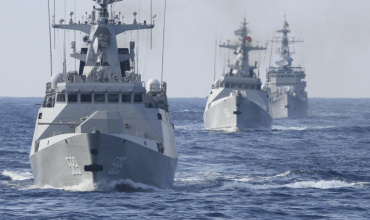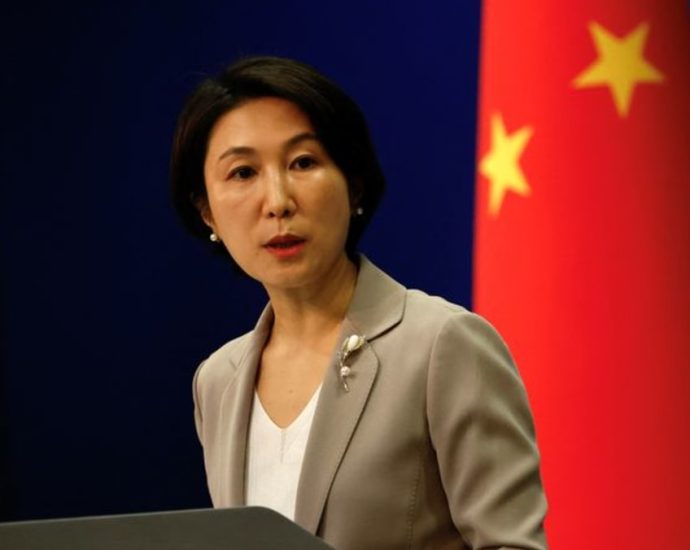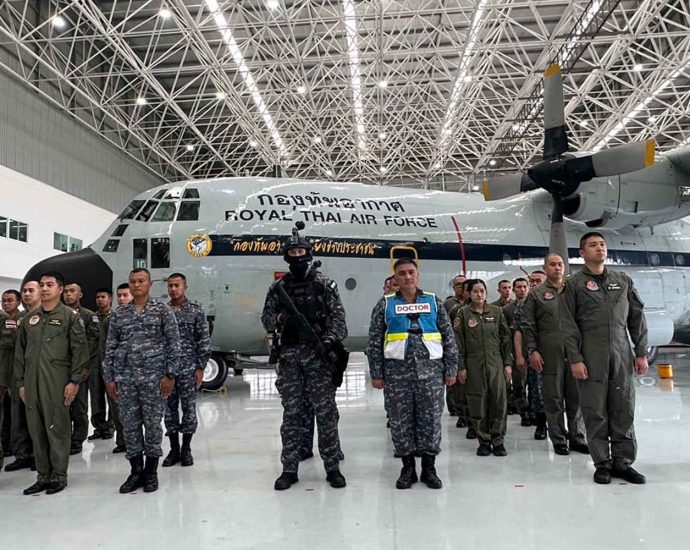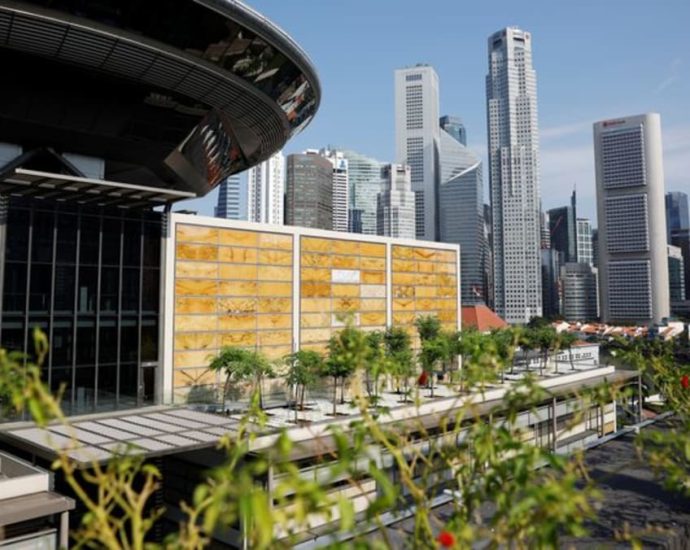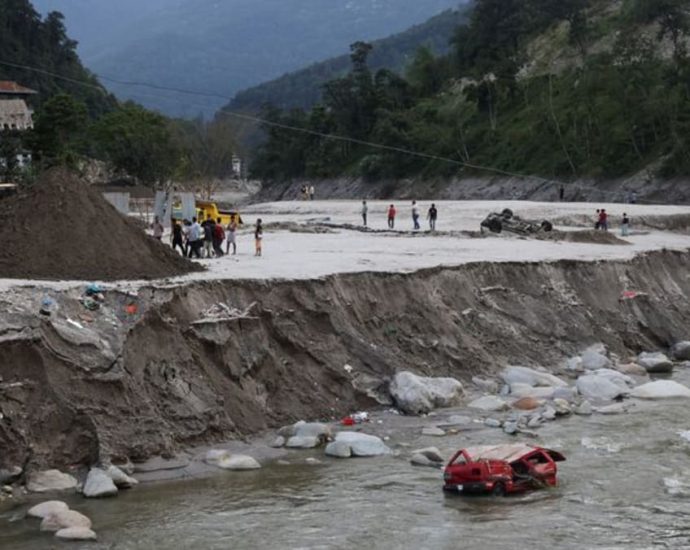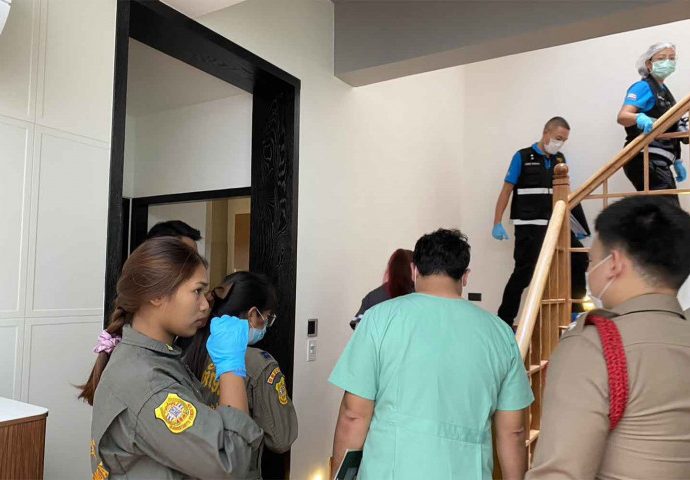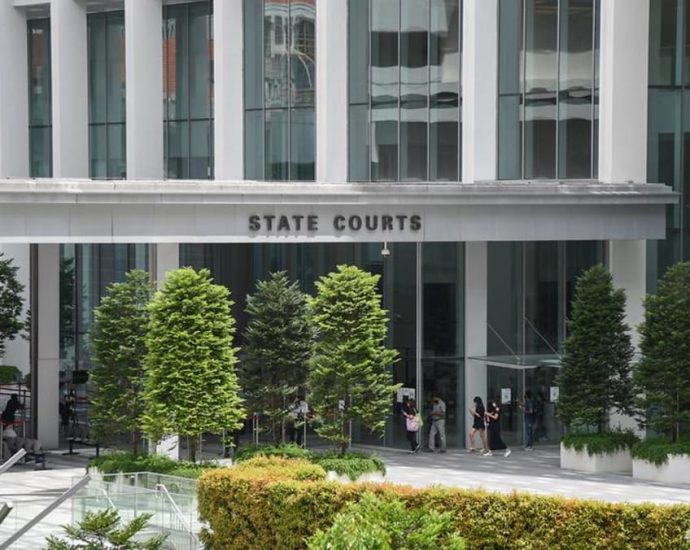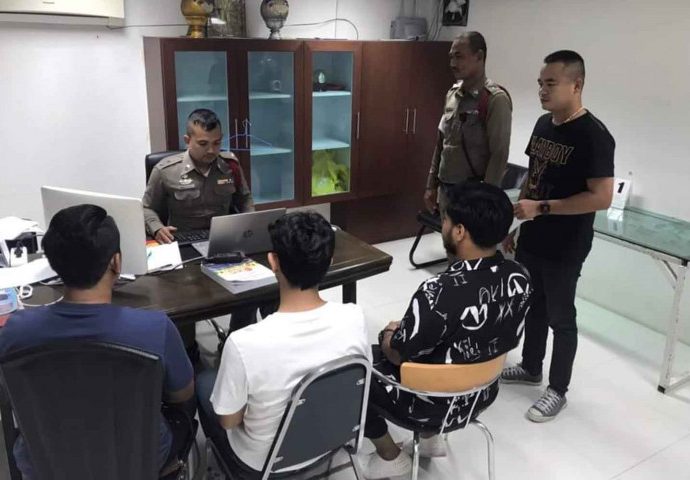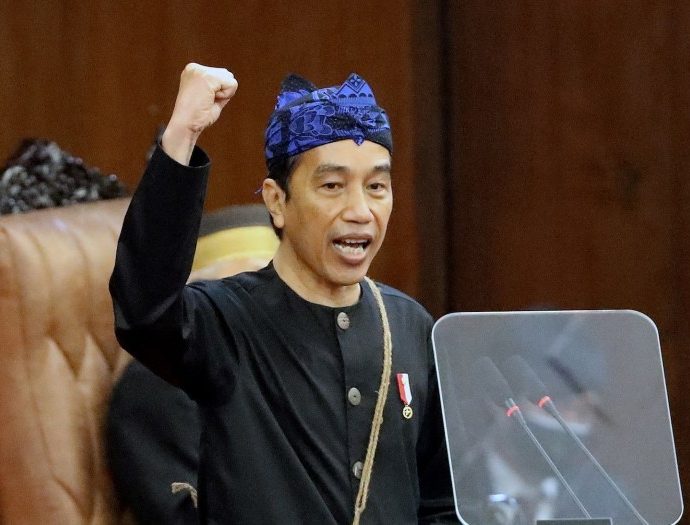US crisis hotline calls ring in empty Chinese rooms
This is the concluding installment of a three-part series. Read Part 1 and Part 2.
As seen in the two previous sections of this report, in crisis situations China’s primary objective is to advance its interests and “win.” Reducing escalation risks is, at best, a secondary consideration. Moreover, Beijing believes that it can benefit from escalation, due to a deep-seated belief that it can readily control military crises, conflicts and even wars.
The one exception is the use of nuclear weapons. Beijing does not think that nuclear escalation would be controlled in a crisis or armed conflict between the US and China, or any other powers. Whether its ongoing nuclear buildup will change this long-standing approach is not yet clear.
Regardless, Beijing’s mindset leads it to assume that Washington pushes for crisis avoidance and management mechanisms less to deal with problems as they emerge than to undermine China and, in the end, increase its power and influence. Under these conditions, the prospects for successful US-China cooperation in improving such mechanisms appear bleak. Nevertheless, there are policy implications for Washington:
• Understanding China’s views of and approaches to crises in general and military crises in particular is paramount to managing expectations about the prospects for new US-China crisis avoidance and crisis management mechanisms.
• Adapting the goals of these mechanisms by focusing them less on managing or resolving emerging military problems and more on communicating positions and intentions may yield better results and prove useful.
• Investing in unofficial US-China dialogues about crisis escalation and management should be a priority given the wide conceptual gap that exists between the US and Chinese approaches as well as the misperceptions and misunderstandings that each side has about the other.
Worlds apart
The starting point is to realize that the United States and China have fundamentally different views of and approaches to crises in general and military crises in particular – and, by extension, to crisis avoidance and crisis management mechanisms.
As the dominant power, the United States generally sees crises as problems that need to be managed or resolved, whereas China views them both as problems to manage or resolve and as opportunities to advance its own interests. The latter goal appears to be significantly more important than the former.
In other words, China is more interested in “winning” crises than in managing or resolving them, likely because it is a rising power unsatisfied with the regional and global orders. Furthermore, China views military escalation as a potentially useful way to deal with crises.
Thus, while the United States tends to think of crisis avoidance and crisis management mechanisms as tools to help maintain communication between the parties involved in a crisis (notably their military forces) and de-escalate tensions, China is in practice highly suspicious of such mechanisms, even if it is not in theory opposed to them, because it assumes that US officials will want to use them to prevail in a crisis.
These suspicions are rooted in the belief that the United States, as the dominant power, is committed to containing and even undermining China and its rise.
This belief is entrenched now more deeply than ever, given references by US officials to “the pacing challenge” and the bipartisan support in Washington to “take on” China. The United States began talking about China as “the pacing challenge” in 2021. It appears, for instance, in Secretary of Defense Lloyd Austin’s memorandum of March 4, 2021, that outlines the Defense Department’s priorities.
Chinese observers are even convinced that the United States is intentionally creating crises in and around China. When in unofficial dialogues US participants talk about the merits of crisis avoidance and crisis management mechanisms, Chinese participants insist that Washington cannot have it both ways (that is, create crises and dangers for Beijing and then turn around and request Chinese help to address them).
Zhou Bo states as much in a recent essay: “China and the United States do not want military conflict, but the United States continues to provoke China’s sovereignty and security in the South China Sea and the Taiwan Strait.” In other words, he says, the Americans want China to “ensure their so-called ‘security’ when they challenge China.”

Chinese participants at the US-China Arms Control and Strategic Dialogue have been especially vocal about Taiwan, accusing the United States of “reckless words and actions” and stressing that “nuclear escalation is in the cards” over the island because Washington would likely not be able to win a conventional war against Beijing.
They assess, plainly, that the United States would now have to use nuclear weapons first to “win” against China in a conflict over Taiwan.
They also continue to claim that Beijing would not use nuclear weapons first, including in a contingency over Taiwan, or any other contingency, and appear genuinely shocked when they hear that Washington questions that claim.
To China, therefore, the idea is that avoiding or managing crises and escalation is the responsibility of the United States. Again, in unofficial dialogues, Chinese participants stress that the United States should “downplay the Taiwan issue” and even “manage the Congress factor” (the latter comment having been made in the context of then speaker of the US House of Representatives Nancy Pelosi’s visit to Taiwan in August 2022).
The message is clear: Chinese participants think that the United States is the troublemaker; if it would only behave, the problem would go away. There would be no crisis.
To a lesser extent, this is also Beijing’s assessment of the “root causes” of US problems with North Korea and Russia.
When in unofficial dialogues US participants stress that the United States now faces increasingly difficult relations with China and outrightly confrontational dealings with North Korea and Russia, Chinese participants recommend that Washington “self-reflect” about the reasons, suggesting that the United States brought these problems upon itself and should receive full blame.
To the Chinese participants, then, China and others are just reacting to issues created by the United States.
This is how, for instance, Chinese participants have explained China’s nuclear buildup. They blame the United States for pressing on with a “big and growing nuclear force” and “the ability to conduct a disarming first strike against us,” forcing China to “take action to ensure the survivability of its nuclear arsenal.”
The bottom line is that, as earlier studies showed, there is little, if anything, to suggest that China considers that its decisions or actions can create problems, including triggering escalation in a crisis.
Furthermore, perhaps due to the worsening of US-China relations and the assertive turn of the Chinese leadership, there is a palpable sense that China today genuinely believes that it is under attack from the United States and that all Chinese decisions and actions are – and would be – purely reactive and defensive.
Put differently, China’s growing military strength and apparent willingness to wield it have not been accompanied by considerations that Chinese behavior, too, could contribute to creating military crises or making them worse.
Poor crisis management record
Given the differences between the two sides, it should come as no surprise that the record of US-China engagement on crisis avoidance and crisis management has been poor.
The United States and China have two hotline agreements in place. Dating back to 1997, the first is a hotline at the presidential level to allow for communication in the event of a serious crisis. At the time, president Bill Clinton said that the establishment of this channel would “make it easier to confer at a moment’s notice.”
That hotline, however, was not used during the 2001 EP-3 incident, when a Chinese fighter jet crashed into a US aircraft and forced it to land on Hainan Island with US service members on board.
The second hotline, called the Defense Telephone Link, was established in 2008 at the defense secretary/minister level and is used for routine bilateral communications on a regular basis. During incidents, however, the hotline has seldom been used. It appears, for example, that the hotline was not utilized during the PLA seizure of an unmanned underwater vehicle in the South China Sea in 2016.
More recently, during the balloon incident this year, US Secretary of Defense Lloyd Austin attempted to reach out to his counterpart, Defense Minister Wei Fenghe, who refused to take the call because the United States had “not created the proper atmosphere” for dialogue and exchange.

It is no wonder that Kurt Campbell, the National Security Council coordinator for the Indo-Pacific, has discussed the merits of hotlines but has also said that a major problem is that they tend to “ring endlessly in empty rooms” when crises emerge.
Exception proves the rule
Still, in recent years, the United States and China have communicated and worked through some issues. At the end of 2020, and in an unprecedented move proving that China does sometimes seek to avoid or manage crises, Chinese officials took the initiative of using communication channels to seek reassurance that president Donald Trump would not create a crisis in the Taiwan Strait to increase his chances of re-election.
Various US-China consultation agreements, despite their limitations, have also worked as expected. At the end of 2021, however, Beijing used the Military Maritime Consultative Agreement to argue that more rules would not facilitate US-China interactions, but that, at root, the solution to crises is for the US military to stop operating within the first island chain.

This suggestion shows that Beijing fundamentally sees little use for crisis avoidance and crisis management mechanisms between two countries that do not have a sound political relationship based on trust. As one Chinese observer put it, “with no mutual or political trust, China finds it impossible to use a military hotline to avoid possible conflict.”
Accordingly, if there is virtually no chance of a US-China breakthrough on arms control in the foreseeable future, the prospects for progress on crisis avoidance and crisis management are not great, either.
Conclusion
“There is no longer any such thing as strategy, only crisis management,” former US secretary of defense Robert McNamara famously stated in summarizing the lessons he and his colleagues had drawn from the Cuban Missile Crisis.
While this view is understandable given the severity of the crisis and the real risks of escalation to the nuclear level, the turn of phrase obscures the reality that even in high-risk situations, including those where the use of nuclear weapons is possible, the parties involved are often pursuing two seemingly incompatible goals: avoiding escalation and prevailing over their adversaries.
This review of the Chinese conceptualization of and approach to military crises makes clear that Beijing is motivated by the pursuit of both goals but is first and foremost interested in advancing its interests and “winning” crises, possibly because it finds itself unsatisfied in the current regional and global orders.
Reducing the military escalation risks is, at best, a secondary consideration. Worse still, Beijing thinks that escalation can be useful due to its deep-seated belief that military crises, conflicts, and wars can be controlled, with the notable exception of those involving nuclear weapons.
Although China’s rapid nuclear modernization may change this long-standing Chinese position, the prospects for successful US-China work on crisis avoidance and crisis management remain dim.
One reason is that China and the United States approach them in fundamentally different ways, with the United States, as the dominant power, having a greater proclivity to try to manage, and even resolve, crises.
A second reason is that, deep down, Beijing assumes that Washington will try to use these mechanisms to enhance its power and influence, especially in the current context where US-China relations are deteriorating at all levels.
What should the United States do in these circumstances?
To begin with, it should not give up on cooperation with China on crisis avoidance and crisis management. It should continue to push such an agenda but be clear-eyed about what these mechanisms can and cannot achieve.
Increasing crisis communication at the operational level would be helpful, given that there are currently no such mechanisms at that level. It would not be a panacea, however, because leaders in Beijing, not PLA officers, make decisions. Still, there is evidence that these mechanisms can work in some circumstances.
At the very least, these mechanisms could help support deterrence by providing in crisis situations a platform for the United States to use to convey its decisions or its resolve.
This is important – even essential – because recent research has shown that China’s default response in a crisis has been “to de-escalate once it perceives an acute risk of confrontation with the United States, a US ally or a country showing a strong will to resist.”
Finally, the United States should invest in Track 2 forums so that US and Chinese scholars can unpack, analyze and discuss key questions together. Focusing on nuclear crisis avoidance and management is particularly critical, given the uncertainties surrounding Beijing’s evolving approach to nuclear weapons.

David Santoro (PhD) is President and CEO of the Honolulu-based Pacific Forum, where he specializes in strategic deterrence, nonproliferation and the geopolitics of Asia and Europe.
This concludes a three-part abridged version of chapter 1 of the new book China’s Military Decision-Makiing in Times of Crisis and Conflict, edited by Roy D Kamphausen and published by the National Bureau of Asian Research, a Seattle-based non-profit institution. Republished with kind permission. Download the entire volume free.
China says ‘opposes and condemns’ actions that harm civilians in Israel-Hamas conflict
BEIJING: China declared on Monday, October 9, that it” opposes and condemns” violence against citizens in Israel and the Palestinian provinces. According to international government spokesman Mao Ning,” China is extremely concerned about the recent increase of discord between Palestine and Israel.” Beijing” is deeply saddened by the civilian casualtiesContinue Reading
12 Thais killed in Israel, 11 abducted, evacuations planned
There are at least 1,000 Thai employees who want to go back.
9 October 2023 at 15:13 PUBLISHED

Companies claim that 1,099 Vietnamese workers in Israel want to depart, and helicopters are being prepared to bring them home. According to the Foreign Ministry, 12 Thai employees were confirmed killed, 9 were injured, 11 were kidnapped by Hamas.
Companies in Israel reported the suicide price, according to spokesperson Kanchana Patarachoke. Before sending the terrible confirmation to their relatives, Thai authorities were also confirming the titles of the Thai sufferers.
The names of the deceased victims are not yet known because it is difficult to obtain an established assurance, she claimed.
Nine Thai people were hurt, according to the spokesperson, and 11 more were kidnapped. The 100 or more citizens taken by the Hamas intruders included the kidnapped Thais. Additionally, they took citizens of Israel, France, Germany, and Georgia.
According to Ms. Kanchana, 1,099 Vietnamese employees that have since expressed a desire to go back to their country. In order to assist them and those who were kidnapped, the government was setting up removal, relocation, and rescue channels.
The Jewish defense department planned to leave all civilians from towns near the Gaza Strip within 24 hours as the violence persisted in Israel.
There are about 30,000 Thai people employed in Israel, with 5,000 of them living close to the Gaza Strip.
Israel’s Tel Aviv airport was still open, but due to the war, many flights were canceling airlines there, and the frequency was said to have decreased by 50 %.
For the return of Thai employees from Israel, the Royal Thai Air Force has prepared its Airbus 340 and five C-130 transport plane. According to sources, the government will even make necessary arrangements for chartered airlines. & nbsp,
Reformed upskirter admitted to the Bar, along with duo who plagiarised while in university
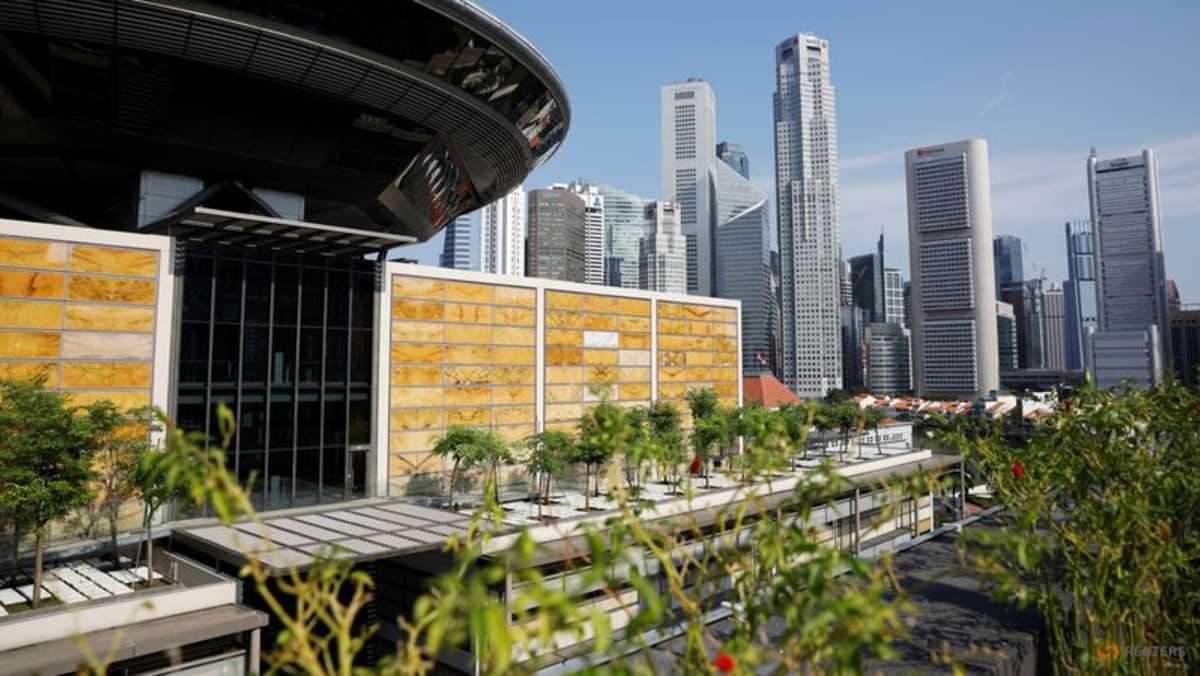
SINGAPORE: The Chief Justice determined that a reformed upskirter and two individuals who engaged in copying while in college were eligible for admission as activists and lawyers of the Supreme Court, and they have been admitted to the Bar.
For taking upskirt video of a person on public transportation in 2018, Mr. Chester Lee Jun Ming was imprisoned for one month.
During his final semester at the National University of Singapore( NUS ), Mr. Chong Weng Teng” self-plied” by using passages from another research paper he had submitted for a different module.
Ms. Lin Shuang Ju plagiarized another author’s work in an article she wrote for Lexicon, a student legal publication club affiliated with Singapore Management University( SMU ).
Chief Justice Sundaresh Menon stated in a decision made public on Monday( Oct 9) that the applicant’s character was the primary consideration in attendance software.
After going over each of their cases, he agreed to let them in after concluding that Mr. Lee had as shown that his character had been changed and that the circumstances surrounding Mrs. Chong and Ms Lin’s cases did not point to deceit or any other character flaw.
The Attorney General, the Law Society of Singapore, and the Singapore Institute of Legal Education determined that the candidates were” fit and proper” for registration based on their personality for all three applications.
THE CASE OF MR. LEE
In May 2017, Mr. Lee captured a girl on two upskirt films while riding public transportation. In January 2018, he admitted to insulting a person’s reserve. A second, related charge was also taken into account. He was given the harsh sentence of one month in prison.
Although the crime had occurred six years earlier, the Chief Justice remarked that its seriousness never be overstated.
Someone capable of committing such an offense” will almost always be found to be inadequate for admission as an advocate and solicitor in terms of his character ,” according to Chief Justice Menon. Physical offenses” always and eventually entail a serious violation of the dignity and physical integrity, frequently causing deep-seated trauma.”
However, he discovered that Mr. Lee had” properly reformed his personality” over the previous six years and was” no longer the same person as the person who committed the offense.”
He noted, among other things, that Mr. Lee followed MRT staff’s instructions when he was apprehended, confessed to his wrongdoing to the police, and immediately informed his company of the cost while expressing regret.
Mr. Lee maintained a spotless legal and educational history after being released from prison, according to the Chief Justice.
He continued to work full-time, enrolled in law school, graduated, passed the bar exams, and finished a practice teaching deal.
Additionally, Mr. Lee got character references from two people, including his immediate officer and a former Malaysian prosecutor who claimed to have corrected his character after learning from his errors.
Chief Justice Menon even remarked that Mr. Lee did not attempt to minimize his guilt in any way when he applied for entrance, but rather fully disclosed his offense.
Instead, he acknowledged that his actions were” wrong, despicable, and disrespectful to women ,” and the Chief Justice was convinced that” considerable reformation of his character” had taken place.
Additionally, he said that” nearly all forms of legal punishment are inevitably intended to, and would, have some remedial effect on the offender.”
According to him,” Legal abuse can give an offender the motivation to understand why what they did was bad and to reform themselves to avoid doing the same again.”
It seems reasonable to assume that legal consequence has contributed in some way to an applicant’s character reformation when they have endured it and have kept a clear record for an extended period of time afterward.
Due to all of these factors, Chief Justice Menon determined that Mr. Lee had changed since his offense and was suitable for bar registration.
THE Circumstances OF PLAGIARISM
Mr. Chong, the next person, stole his own job while enrolled in the China and International Economic Law component of the NUS ‘ Faculty of Law during his last quarter.
He reused sections of another study papers he had formerly submitted for a different module when submitting this one.
Such behavior was forbidden by NUS Law’s humane conduct standards and its copying policy.
After the class conducted a copying investigation, Mr. Chong acknowledged his wrongdoing, expressed regret, and stated that he would take any punishment.
In order to postgraduate in 2022, he retaken the unit after receiving zero signs on the paper as a punishment.
According to Chief Justice Menon, this” academic offense” was caused by his ignorance of plagiarism instructions and” his ignorance that theft only involved copying someone else’s work ,” not by a lack of academic unity.
He was discovered to be honest when he self-plied, but really conscious that his actions were against NUS’s rules.
According to Chief Justice Menon, Mr. Chong’s neglect in this instance did not reveal a character flaw.
He emphasized how crucial it was for Mr. Chong to admit his error, express regret for it, and accept the punishment without hesitation right away. Despite the fact that there was no common report, he even fully disclosed his offense in his application for admission to the table.
When a senior lecturer asked the next applicant, Ms. Lin, to write an article on cats trusts for SMU’s Lexicon, she plagiarized the work of another author.
Early in July of this year, the article was published in the Singapore Law Journal, but immediately after, a copying objection was received.
She is accused of plagiarizing a piece written by Mr. Andrew B. F. Carnabuci. In the notes of her post, Ms. Lin had cited Mr. Carnabuci’s content twice.
At a meeting on July 26 of this year, Ms. Lin gave her accounts of what had happened to SMU. Domestic investigations by SMU revealed some evidence of theft in the form of some use of other people’s work without proper attribution.
But, SMU also discovered that by improving identification and editing appropriately, this could be fixed. Ms. Lin apologized to Mr. Carnabuci in a letter, and he accepted her apologies.
The Chief Justice concurred that Ms. Lin’s theft didn’t seem to have involved deception. He took into account her quick apology, which Mr. Carnabuci accepted.
The Chief Justice claimed that the issue with Ms. Lin’s post was that she had paraphrased different concepts from various articles, cited those texts, and synthesized andnbsp, those concepts into an essay on the subject.
This wasn’t appropriate for an intellectual article, even though it might have been suitable for a university assignment. Ms. Lin entirely misunderstood what was expected of an intellectual publication in that regard, he claimed.
It was Ms. Lin’s second time publishing an educational article, and because it lacked publishability, it was gradually retracted.
Chief Justice Menon admitted her to the club because there was no evidence of deception in the situation.
Death toll from flash floods in Indian Himalayan state climbs to 74, scores missing
In the first five days of October, Sikkim, a Tibetan position with 650 000 residents that is tucked away in mountains between Nepal, Bhutan, and China, received 101mm of weather, more than twice as much as usual. An estimated 1, 000 persons in Sikkim died in landslides in October 1968.Continue Reading
Indonesia expects to finalise US$560 million railway loan from China next week
The new product is in addition to one that the China Development Bank has approved for the pool in 2017 and is for US$ 4.55 billion. This loan has a 40-year term, ten – year grace period, and an annual interest rate of 2 %. Jakarta had previously stated thatContinue Reading
Myanmar man prime suspect in murder of ex-ambassador
PUBLISHED: 9 October 2023 at 13:34

Officers were on Monday looking for a young man from Myanmar who worked for Vichit Vihithitmarn, the original Thai embassy to Denmark, who was fatally stabbed over the weekend at his Chatuchak home.
Sai Myat Moi, a 19-year-old, was the believe, according to Pol Maj Gen Attapol Anusit, deputy director of the Metropolitan Police Bureau.
Vichit & nbsp, age 63, was discovered dead on Sunday inside his home at a housing estate on Vibhavadi Rangsit 20 Road with three stab wounds to his chest.
According to reports, the sufferer moved into the home on September 9 and lived it by herself. Since September 19, the presume had been employed by him at the residence.
Officers think the murderer’s intent was assault. Cellular phones and tablet computers from Vicht were nowhere to be found.
Authorities claimed that the suspect withdrew a sizable sum of money, valued in six-digits, from an ATM at the shopping center just days after the alleged time of the murder. Since then, he had not been seen. & nbsp,
Businessman ‘invested’ S$360,000 hoping to become Singaporean, gets jail for lying in pass application
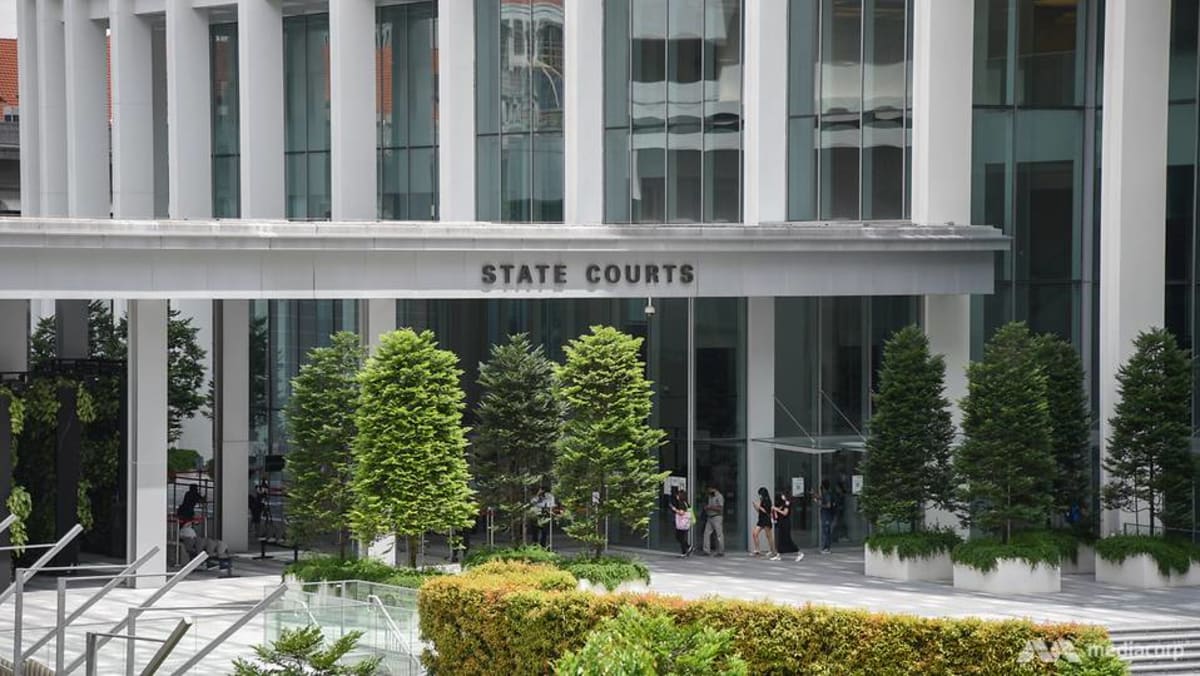
SINGAPORE: In order to obtain an employment pass, a foreign businessman falsely claimed that he would be working for the local company in front of the Ministry of & nbsp, Manpower ( MOM ).
In actuality, he had no intention of working for the business. Instead, the purpose of the pass was to make his stay in Singapore legitimate so that he could eventually obtain permanent residency and Singaporean citizenship in exchange for a” investment” in the business worth S 360 000 ( US$ 263 000 ).
Chinese national Zhang Qingqiao, 37, was given a four-week prison term on Monday( Oct. 9 ) for one count of making an untrue declaration to the Controller of Work Passes.
He had denied the accusation, but at the end of the test, he was found guilty.
Zhang was a seasoned entrepreneur who started investing in 2012 while still in China, according to the jury.
His long-term goal was to relocate his entire household to Singapore and establish themselves there, finally obtaining citizenship and permanent residency in Singapore.
Zhang met Wang Jue, also known as Jess, around July 2019 while he was pursuing a Marketing in Singapore.
Zhang’s defense claims that Wang continued a dishonest investment plan. & nbsp,
Zhang made the decision to” invest” S$ 360,000 in MW Dynamics after meeting Wang. This came after he turned down a$ 2 million investment plan that would have allowed him to obtain PR status in three years.
He would acquire an employment pass from the business as part of the program, where he would receive a monthly income of S$ 10,000.
He had allegedly receive the S$ 360,000 back through his salary after three years, and he wouldn’t have to do any work or give a review to the business.
Even though he had no plans to work for MW Dynamics, the judge noted that the goal of this” zero-returns” investment was to obtain an employment pass with the company in order to justify his stay in Singapore.
In accordance with the plan, Zhang signed and gave the Controller of Work Passes a resolution requesting an employment go in September 2019.
He stated on the application that he would be working as a business growth director for MW Dynamics and earning S$ 10,000 per month.
The program was given the go-ahead.
Zhang’s punishment comes after another Foreign nation, Yu Huajie, was sentenced to seven days in prison for comparable offenses. It is unclear how the wrongdoings were discovered.
When Wang applied for an career move, he had a similar experience.
Zhang’s defense group claimed Wang was a survivor who had been duped during the trial and pointed the finger at Wang.
The defense’s attempt to place the entire blame on ( Wang ), according to the judge,” did not persuade him.”
While defense attorneys Mr. Sunil Sudheesan and Ms. Joyce Khoo of Quahe Woo & amp, Palmer, requested a fine, the prosecution sought four to six weeks in jail for Zhang.
JUDGE’S COMMENTS
According to the information, according to Principal District Judge Victor Yeo, Zhang entered into the investment in order to obtain an employment pass and was aware from the beginning that he was not required to work for the business.
His claims that he didn’t read, write, or speak English and trusted Wang with the employment pass application were” unconvincing ,” according to Judge Yeo, who is an experienced entrepreneur who can consult with his attorney about investments.
The 18-month-long deception immediately violated MOM’s policy for issuing like passes.
According to the prosecutor, it also has an impact on immigration legislation.
The defense had argued that this situation was distinct from normal Employment of Foreign Manpower Act circumstances, which frequently involve accidental employers who break the law in order to make money, or false or forged qualifications. & nbsp,
However, Judge Yeo claimed that Zhang had given MW Dynamics a sizable sum of money, so the defense’s claim that the wrongdoing company in this case had certainly benefited financially would not be entirely accurate.
Zhang could have easily obtained an employment pass through his home business, just as his family had done, according to Mr. Sudheesan.
Judge Yeo, but, stated that he could not offer this much weight. It was” pure speculation ,” to start. Zhang had chosen this way, which required a fake pronouncement, even if he was successful in other ways to obtain PR status or citizenship.
Zhang’s family is” very settled” in Singapore, so Judge Yeo added that he could not give much weight to the possibility of imprisonment or an access ban.
He said,” I do not consider this to be a very relevant consideration.”
Zhang wants to challenge his judgment and word.
Wang was potentially face criminal charges for assisting Zhang with his work go program, according to the court’s justifications for convicting Zhang.
Zhang could have been imprisoned for up to two years, fined as much as Mho$ 20,000, or both for submitting a false application for an employment pass on his resolution form.
Tuk-tuk drivers arrested for assault on Saudi tourist
9 October 2023 at 13: 24 PUBLISHED

PHUKET: A Saudi Arabian visitor was assaulted outside a Phuket motel on Sunday, and three cabs – taxi drivers were detained on Monday.
Following a picture that was posted on social media allegedly showing tuk-tu driver attacks on Saudi tourists at the Amata Hotel on Rat Uthit 200 Years Road in the Patong location on Sunday, PatONG authorities opened an inspection.
Police detained three men in the Patong area — Anusorn, 29, Apisit, 26, and Nusrulloh, 28, all of whom were taxi drivers — after reviewing footage from nearby security cameras. They did not give their whole names. & nbsp,
According to authorities, Mr. Anusorn drove the visitor to the 7Q Patong Beach Hotel on Rat Uthit 200 Years Road from the jaws of Soi Saen Sabai around 6.15 a.m. on Sunday. The agreed-upon price was 200 ringgit. The customer claimed that wasn’t where he was staying when the limo – tok arrived at the hotel. He requested that Mr. Anusorn get him to the Amata Hotel, which is located on Rat Uthit 200 Years Road as well.
When they got there, the tuk-tok drivers demanded 400 baht, which was twice the price that had been agreed upon. & nbsp,
According to police, the Arabian man refused to pay the full amount, and the two men argued. Therefore, according to reports, Mr. Anusorn dialed his cellphone and requested assistance from Mrs. Apisit and Nusrulloh.
The two guys attacked the Royal tourists when they arrived because the two sides were still unable to resolve the fare dispute, according to authorities.
Indicted for rape in the Phuket Court were the three owners of the limo. Police announced that they would also request a suspension of functioning licenses from the Phuket transportation office.
Israel-Hamas crisis tears a splintering ASEAN in half
Following the most recent round of hostilities in the Middle East, the Philippine national palace said in a statement that the country” convenes its deepest sympathies and sympathies to those who have lost family members and loved ones in new problems.”
The South Asian country added,” The Philippines condemns the attacks, particularly against human populations ,” in reference to the extraordinary Hamas business attacks in Israel that have claimed hundreds of lives, including citizens.
In stark contrast to the Philippines’ place, neighboring Malaysia reiterated its support for the Arab people in the wake of the Hamas attack on Israel.
Anwar Ibrahim, the prime minister of Malaysia, took to social media to criticize the reportedly biased global coverage of the most recent round of violence, highlighting the fate of Palestinians who had been imprisoned for a long time in occupied areas.
Anwar referred to the mass eviction of Palestinians following decades of Arab-Israeli issue in a post on X, saying that the” Israel government” is relentless in its seizure of land and property owned by the Arab people. He continued,” Lots of innocent lives were sacrificed as a result of this injustice, shifting the blame to Israel.”
The Malaysian foreign ministry portrayed Israel” as the occupier ,” which subjected Palestinians to” prolonged illegal occupation, blockade, and suffering ,” in a forcefully phrased statement. Indonesia, which has a majority of Muslims, even reiterated its help for the Palestinians’ fight for independence.
Similar to this, the largest country in Southeast Asia argued that”[ t ] the root of the conflict, namely the occupation by Israel, must be resolved, in accordance with the parameters agreed upon by the UN ,” referring to various UN Security Council Resolutions endorsing a two-state solution to the Palestine-Israel conflict.
Indonesia, an emerging world power, made an effort to project management by stressing the necessity of” an immediate end to violence to prevent further animal casualties.” The third-largest democracy in the world, Southeast Asia, has recently made an effort to establish itself as a possible mediator in numerous conflict districts, including those of the Middle East and Eastern Europe.
For their part, the other two major Southeast Asian countries of Vietnam and Thailand adopted an even more neutral stance on the escalating conflict, reflecting deep divisions among the Association of Southeast Asia Nations( ASEAN)’ s core members on yet another significant conflict.
Various Interests
ASEAN has recently had a difficult time bridging strong divisions over numerous problems in its own garden. On the one hand, the local body hasn’t come up with a popular approach to resolving the South China Sea’s festering disputes.
East Asian countries haven’t reached a consensus on China’s growing military presence in the contentious water after decades of negotiations. As the ASEAN chairman for this year, Beijing-friendly member states undermined Indonesia’s plans for all-ASEAN marine drills, and the US-allied Philippines completely avoided the occasion.
Groups are even more pronounced in Myanmar due to the escalating legal war. Thailand and Cambodia have preferred direct confrontation with the ruling commanders, whereas Indonesia and Malaysia have favored a more aggressive approach against the military dictatorship in support of Myanmar’s exiled democratically elected government. The dominance of local politics and national objectives has repeatedly torpedoed ASEAN 1.
The Philippines has generally been more tolerant of Israel’s status as a US agreement ally. In actuality, the ballot of the Southeast Asian country played a significant role in the establishment of Israel. Strong diplomatic economic relations exist as well: In the 1980s, as many as 100,000 Filipinos worked in Israel.

The Philippine Presidential Communications Office( PCO) emphasized the significance of ensuring the safety of near to 29, 000 Filipino staff in the midst of the most recent round of violence in a statement, saying that the government is carefully coordinating with the Philippine Embassy in Tel Aviv and the Migrant Workers Organization( MWO) in Israel to ensure their safety and security.
In addition to having 14 significant diplomatic agreements, the two nations have been looking into strengthening their protection ties, including the potential acquisition of superior surveillance and missile systems as part of an ongoing military modernization initiative in the Philippines.
Thailand has historically adopted a more ambivalent attitude on polarizing issues, despite being an official US treaty ally.
Thailand” joins the global community in condemning any use of murder and indiscriminate attacks and calls upon all parties involved to desist from any activities that would further rise tensions.” The Thai unusual government expressed its hope that things in Israel will quickly return to normal.
It continued, emphasizing the South Eastern country’s similar worries about the security of its people working and residing in the Middle Eastern country,” The Thai government is seriously concerned with the safety of Thai citizens working in Israel who have been affected by such violent situations.”
Vietnam, which was ruled by communists, stated that it was” intensely concerned” and generally adopted a stance that is much more in line with the position of Eastern power like China and Russia, who did not directly support Israel.
According to a statement from Vietnam’s foreign ministry,” we call on relevant parties to exercise restraint, refrain from taking actions that complicate the situation, and soon resume negotiations to resolve disagreements through peaceful means, on the basis of international law and the relevant resolutions & nbsp, of the United Nations Security Council and ensuring the safety and legitimate interests of civilians.”
allying with Palestine
Governments that were democratically elected in Malaysia and Indonesia, where the vast majority of Muslims support the Palestinian reason, adopted fundamentally different stances. & nbsp,
The Malaysian Foreign Ministry stated in a statement over the weekend that” Palestinians have been subjected to the prolonged illegal occupation, blockade and suffering, the desecration of al-Aqsa ] mosque ,” as well as the politics of dispossession at the hands of Israel as an occupier.
It continued, discouraging Israel from taking any disproportionate action that might cause significant suffering among Israeli civilians in occupied territories.” At this crucial time, more loss of life, suffering, and destruction should stop and parties must exercise maximum restraint and de-escalate.”
Malaysia also emphasized the significance of carrying out pertinent global agreements in order to achieve a fair peace and urged the UN to act quickly to de-escalate the issue.
According to the government, the Council needs to call an emergency session right away to demand that all parties stop the violence and respect and safeguard the lives of defenseless civilians.
Indonesia, the largest country in the world with a majority of Muslims, even tended to sympathize with the Palestinian cause.
A few years ago, Indonesian leaders publicly denounced America’s decision to recognize Jerusalem as the capital of Israel at the expense of a future independent Palestinian state in accordance with pertinent UN agreements, warning that”[ t ] his can rock global security and stability.”
When Israeli Prime Minister Mohammad Shtayyeh paid a visit to Jakarta in October 2022, President Joko Widdo reiterated his commitment to the Arab lands. In 2011, Indonesia used donations from Indonesians to construct a doctor in Beit Lahiya, Gaza Strip. & nbsp,

In the East Asian country, anti-Israel attitudes are pervasive. FIFA revoked Indonesia’s permission to sponsor the Under-20 World Cup earlier this year in response to objections to Israel taking part in the competition.
Three elements of Indonesia’s support for Palestinians, according to a speech, are diplomacy, trade, and humanitarian aid.
However, it is unclear how the Southeast Asian country did resolve its own different views on the matter, much less unite a region that is sharply divided over the most recent Middle Eastern conflict.
Follow Richard Javad Heydarian, formerly X, on Twitter at @ RicheyDarian.

